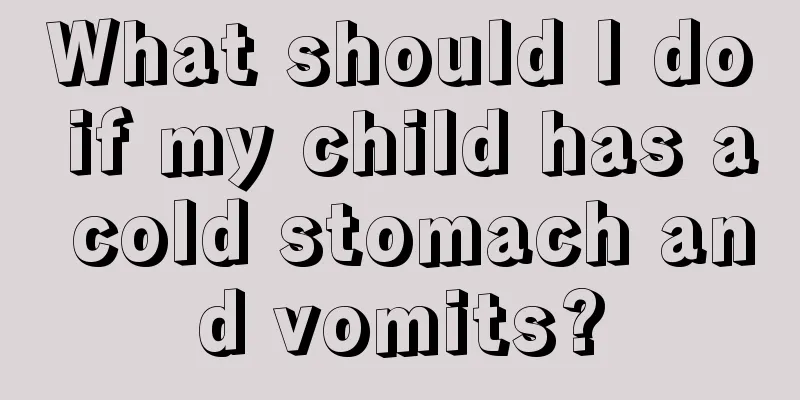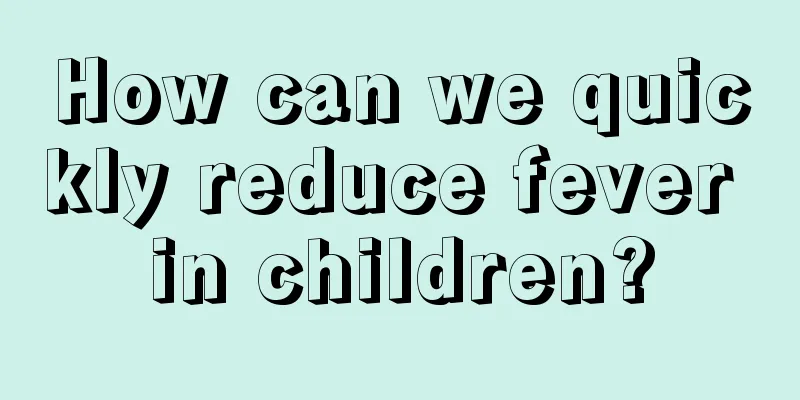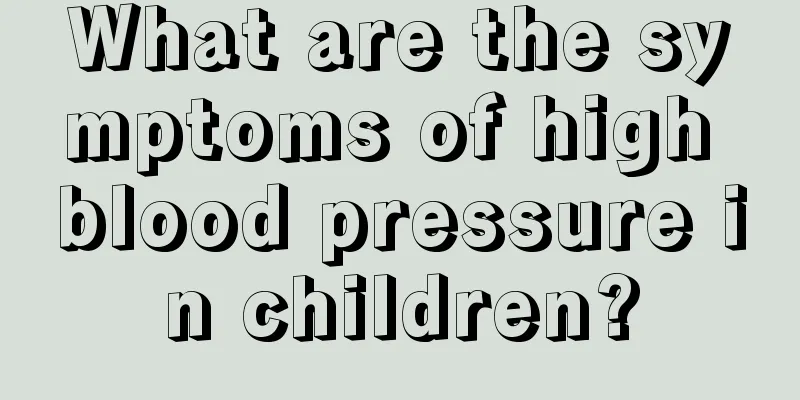What should I do if my child has a cold stomach and vomits?

|
For children, vomiting is not a common occurrence, so if parents find that their children vomit frequently, they must take their children to the hospital in time to find out what disease they have. In real life, there is also a situation where the child eats too much cold food, or exposes his belly when sleeping, and the stomach gets cold and causes vomiting. What should we do at this time? 1. Maintain open airways When vomiting is severe, vomitus may spray out of the nasal cavity. Parents need to immediately clear the foreign objects in the nasal cavity to keep the respiratory tract open. If vomiting occurs when the baby is standing upright or lying in bed, you can first let the baby lean forward or maintain a side-lying position to allow the vomit to flow out easily and prevent the baby from inhaling vomit, thereby avoiding suffocation or aspiration pneumonia. 2. Keep your mouth clean After vomiting, some stomach acid, digested, and undigested food residues will remain in the mouth. The unpleasant taste will make the baby more uncomfortable. So for younger babies, parents can clean their mouths with wet gauze and boiled water; for older babies, they can rinse their mouths with warm boiled water to keep their mouths clean. 3. Fast briefly, then eat a light meal Often parents panic when they see their children vomiting, and feel sorry for the children, so when the vomiting stops, they rush to feed them, which results in a second wave of vomiting (they may vomit more than they eat!). In fact, the best way to deal with vomiting is to temporarily fast for four to six hours, including not drinking water or milk, and wait for the vomiting reaction to pass. During this period, if the baby cries for water, you can moisten his mouth with a cotton swab dipped in water. For older babies, you can give him a lollipop. When the symptoms improve and the baby is more comfortable, give the baby several small amounts of electrolyte solution (sports drinks can be used instead, but if diarrhea occurs at the same time, the sports drinks should be diluted before drinking). If there is no obvious nausea, vomiting, or abdominal distension, light food (such as porridge, dry rice, white bread, steamed buns) can be given again, but dairy products and greasy foods (such foods can cause bloating or nausea) should be avoided for two to three days. 4. How to take medicine after vomiting Some antiemetics need to be taken thirty minutes before eating. When you are sick, some medicines, such as cough medicine and runny nose medicine, are optional, but some medicines, such as antibiotics, must be taken according to the doctor's instructions. If you vomit a lot within thirty minutes after taking the medicine, you will need to take another dose; if you vomit within thirty minutes to one hour, you can take another half dose; if you vomit two hours after taking the medicine, most of the medicine has already moved into the small intestine and will not be vomited out, so there is no need to replenish the medicine. See a doctor as soon as possible Vomiting is just a symptom. It may be one of many symptoms of many diseases. Although 80% of vomiting is caused by gastrointestinal problems, if the baby has persistent vomiting, in addition to timely replenishing electrolytes and water and paying attention to whether the baby has symptoms of dehydration (rapid breathing and heartbeat, wanting to cry but no tears, sunken anterior fontanelle or eye sockets, lack of urine, and decreased vitality), the baby should be sent to the doctor as soon as possible to find out the cause. After seeing a doctor, no matter at any time, if the vomit is yellow-green or brown, the stomach pain becomes more severe or is accompanied by severe diarrhea, and there is no improvement after taking medicine, you should return for examination or be hospitalized as soon as possible. |
<<: What to do if your child has a fever, cold, or cough
Recommend
What causes testicular pain in children?
Parents need to pay attention when they hear thei...
What to do if your baby only has a runny nose
Some babies have weak physical resistance and wil...
What are the effects of anger on children?
I don’t know if you have ever encountered a situa...
What to do if your child has a lot of earwax
Earwax is a yellow liquid. Some people have drier...
Is it necessary to test bone density in children?
For some new mothers, they are always caught off ...
What should I do if my baby has coffee spots on his face?
The skin on the baby's face is relatively del...
How often do children change their teeth?
Babies usually start to grow full teeth between t...
Can children eat spirulina regularly?
Everyone knows that spirulina has many benefits, ...
The dangers of excessive zinc supplementation in babies
Zinc is a nutrient required by the human body. It...
What to do if your baby has a thick nasal discharge or stuffy nose?
It is normal for babies to have a runny nose, but...
What to do if a hernia recurs after surgery in children
Today's society advocates eugenics and good p...
Is it ok for a two year old baby to eat breast milk?
It is not good for a two-year-old baby to eat bre...
What should I do if my one-year-old baby suddenly cries while sleeping?
One-year-old babies already have some expressive ...
Methods to reduce jaundice in newborns
It is very common for newborns to have jaundice, ...
Reasons why babies cry when they sleep
The baby is the most important person in a family...









